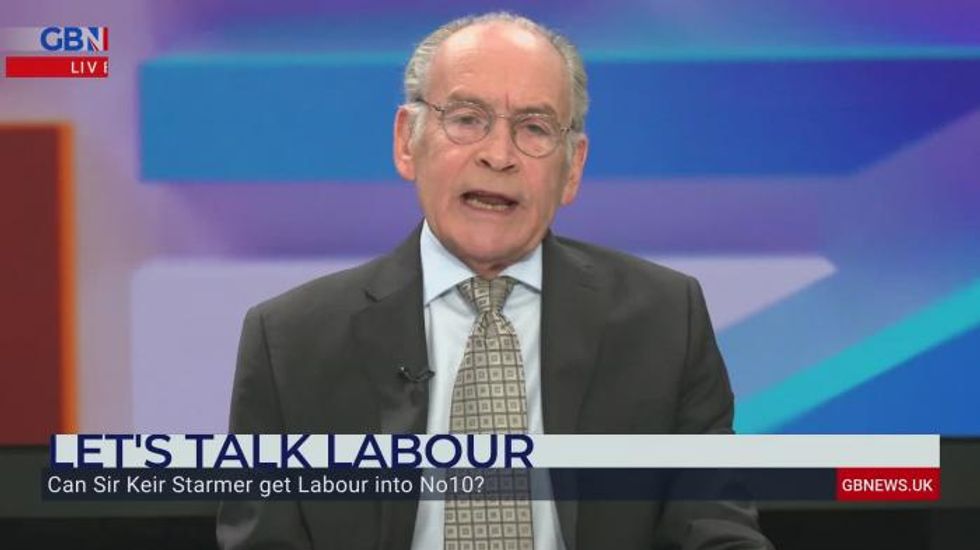'We really do need to talk about Labour'
Don't Miss
Most Read
Trending on GB News
In the Thatcher era, and her big parliamentary majorities, two of her lieutenants - Quentin Hogg and Francis Pym - cautioned about the dangers of ‘elective dictatorships’.
It cost them their jobs, rather proving the point.But it came to mind as I trawled through Sir Keir Starmer magnus opus, penned on journeys across the land, as he sought to figures out what Labour was for and, to a degree, what he was for.
First the basics: in a democracy you need an opposition.
Not insiders, snipping at the leadership, though that adds zest to our politics.
It is more profound than that.You need a party with the ability to probe, challenge and expose weaknesses in what the Government is doing.
And it needs to be a party with a defined set of alternative policies, offering the electorate a clear choice.
Too often opposition’s have been like Harry Enfield’s grandpa character constantly bleating “you don’t want to do it like that” without demonstrating how you do want to do it.
Hanging pictures is one thing and worth an Enfield laugh, but when it is health, education, reliable utilities, defence and security, as home and abroad, its all a but more important.
Most who have read the Fabian pamphlet from Sir Keir remain deeply sceptical that we are any closer having anything approaching a clear vision of what Labour and its leader are for.
Much of the criticisms hinge on the vagueness and the platitudes: there’s nothing to frighten the horses and little to fire the soul.
“Putting hard working families and their priorities first” and “restoring honesty, decency and transparency in public life” are fine but are hardly going to whip up floating voters into a frenzy, nor drive them to the barricades.
It is not as if there aren’t gaps in the Government’s defences.
Families, generally, are wrestling, right now, with the gas and electricity crisis, partly caused by an inept and ill-prepared Government and a daft cap proposed by Labour, rejected by the Tories only to be put in place by - the Tories.Memories of allegedly dodgy deals at the peak of the coronavirus linger if you think, even briefly, about ‘honesty and transparency in public life”.
The goal is open.But it needs a long-term, strategic vision as much as the the short-term capacity to clout a Government. Post-war, Clement Attlee had a welfare state vision and won.
The Tories trundled along, somewhat complacently during the 50s because, I suppose, “we’d never had it so good” as Harold Macmillan claimed.
But Harold Wilson spotted the move from a declining smoke-stack economy to a brave new industrial world, emerging from invention and electronics: he urged Labour and the country to master the ‘white heat’ of that technological revolution.
Thirty years later, Tony Blair capitalised on what many saw as the cold, heartless drive of Thatcherism that made some very wealthy and left others struggling as the tap of tax-payer subsidies was turned off and ‘stand on your own two feet’ became the mantra.
It served her well and, I’d argue, the majority of the country, but it left a space for Blair to offer ‘power through principle and the purpose of the common good’.
So the motherhood and apple pie stuff of Starmer isn’t really up there with some of his predecessors.
Even the ‘contribution society’ Starmer offers seems a thin variant of the ‘social contract’ in the troubled 1970s.
Add to that the fact that the Unions are going cool on him - many oppose his efforts to rationalise the Miliband leadership election process, which delivered Corbyn - and, worse still others aren’t even bothering to attend the party conference.
Big Labour beasts like Andy Burnham and Sadiq Khan are lukewarm, too.
Poised, perhaps, to challenge? Well, shutting the door on them rather lies in Starmer’s hands but he doesn’t seem any close.
It all makes it rather more urgent for Starmer to define what the Labour party of the 2020s is, and what it is for.
Much of Labours Keir Hardie vision of democracy and workers rights and has been achieved in the 150 years of Labour’s existence but surely no-one would argue it is simply job done - or would they?
If Labour just wants to say it will do what Johnson is doing but in a nicer and more efficient way, it won’t work. Real Labour supporters won’t buy that and others will conclude it is probably better to leave those policies to those who actually believe in them - the Tories.
If it is back to the Clause 4 socialism of Michale Foot and Jeremy Corbyn it will surely be rejected.
If it remains an intellectual and political political vacuum, it will be filled by yet another Tory government.Starmer has his leader’s speech next week .
He will, I'm sure, put some flesh on these rather thin bones. The election is probably still a year and a half or two away.
But, my, there’s a lot to do.
My final thought is this, and it is brilliantly captured by Frazer Nelson in today’s Telegraph. A leader needs zest, charisma and magnetism, as well as ideas.
Due to the Boris Johnson’s trip to the UN, PMQs were contested between Deputy PM Dominic Raab and Shadow Deputy PM Angela Rayner.
You may have agreed or disagreed with much of what Ms Rayner asked and the quips and barbs she hurled at Raab but, goodness me, she did it with passion and fired up her own side.
So maybe it isn’t just about what Labour stands for and hopes to offer us.
Perhaps it is also about who’s crafting the package and offering it.
Yes, we really do need to talk about Labour.









